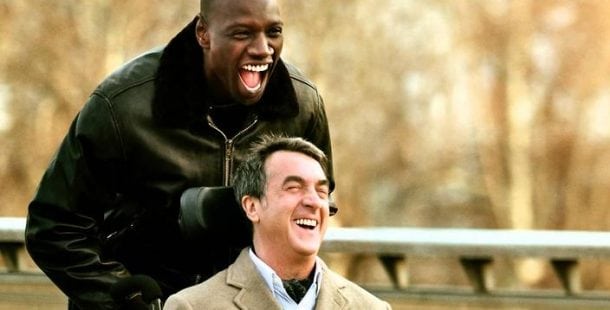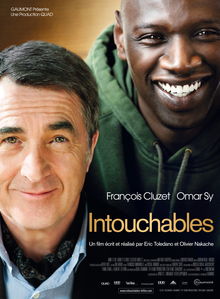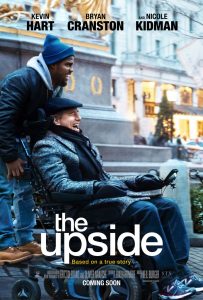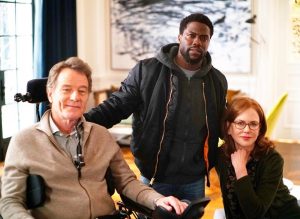The Intouchables (2011) | Written and Directed by Oliver Nakache and Eric Toledano, adapting the story by Phillipe Pozzo di Borgo | 112 min
The Upside | Directed by Neil Burger | Written by Jon Hartmere, based on the script for The Intouchables | Prime Video
A massive hit in Europe, The Intouchables is a stone-cold crowdpleaser, the based-on-a-true-story tale of a wealthy Parisienne, Philipe (Francois Cluzet), a paraplegic who hires Driss (Omar Sy), a young man from the projects, to be his caregiver. It’s a surprisingly stylish, good-looking picture that opens with a Maserati racing through the Paris streets at Diana speeds—Driss stunting with Phillipe in the passenger seat. It’s a great start. The film that follows, told in flashback, is alternately funny, bawdy, and not beyond straying into bald-faced sentiment. It’s also got an unfortunate streak of hard-to-swallow racial stereotyping, but Cluzet and Sy are such a winning double act, their chemistry wins over the rough patches. And Paris sure is fetching.
The Intouchables was distributed by the Weinstein Company, and the inevitable Hollywood remake, The Upside, got scuppered in the Weinstein collapse—it was at TIFF in September 2017 and has vanished since then. It finally gets a release in the dead zone of early January, when all the Oscar bait is still in cinemas, which isn’t a vote of confidence for the picture. Surprisingly, The Upside sustains the heartwarming elements of its progenitor, while sweetening the story in some areas, and changing it up in others.
From Paris the story is moved to New York. Dell (Kevin Hart) is an ex-con looking for a signature that says he’s looking for work in order to get his parole officer off his back. He stumbles into a job interview to be a caregiver to Philip (Bryan Cranston), a paraplegic billionaire, with a staff of other therapists and caretakers, including his executive assistant, Yvonne (Nicole Kidman in a role much larger than her French counterpart, but still kind of thankless).
In The Intouchables, Driss had multiple siblings and a foster mother, where in the remake Dell has a son and an ex who want nothing to do with him. That Dell’s family are fully fledged characters lifts a lot of the racial stereotyping that soured the original, which is great, but Dell still winds up the subject of class condescension from white characters that the film just goes along with. He also winds up being a lot less compelling than Driss.
It’s not that Hart isn’t funny or appealing, he’s both. He’s just nowhere near as dynamic a character as his predecessor, playing a more conventional, less coarse, and more predictable guy. What really helps an audience connect with Driss in the French film is his arc is about finding an identity in being a caregiver—Sy really physically commits to what’s required for the role and the character. Dell’s arc ends in the middle of the film when he decides to be a better person, and his connection with Philip is more about their friendship, and less about being someone Philip can rely on. The French film is generally more embracing of and interested in the culture of disability, and what’s required for someone in the caregiver job, where The Upside uses those moments to drive the humour.
That said, Cranston adds depth to Philip. Cluzot’s character was composed, and never really loses his cool. Cranston’s Philip has depressive spells, and adds extra shades to his story—his motivations are more on the surface. This being a Hollywood feature, that’s probably not surprising—on the whole, the film is more obvious, including a painfully manufactured end-of-second-act freak-out from Philip that’s totally out of character, but driven by the needs of the plot.
That said, it stays the course and mostly works, while being nowhere near as stylishly photographed as the first film. If it exchanges some of the racial politics with classism, it also delivers the kind of warm, mainstream fuzzies many audiences will likely enjoy. The Upside also offers a decent example how Hollywood absorbs and remakes films from other cultures, and sometimes does it without totally destroying what worked about the original.










